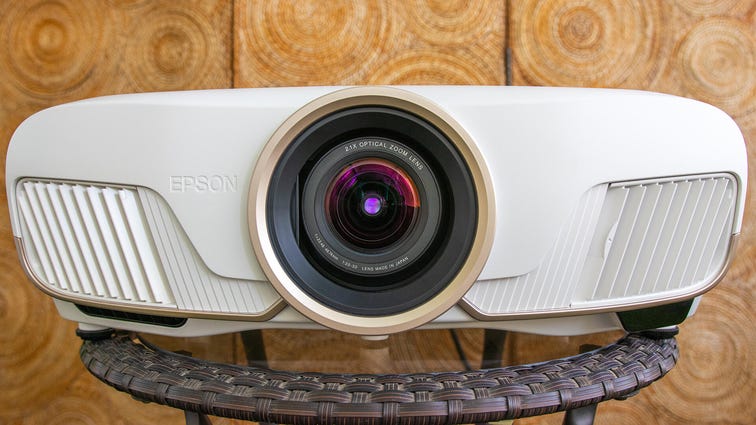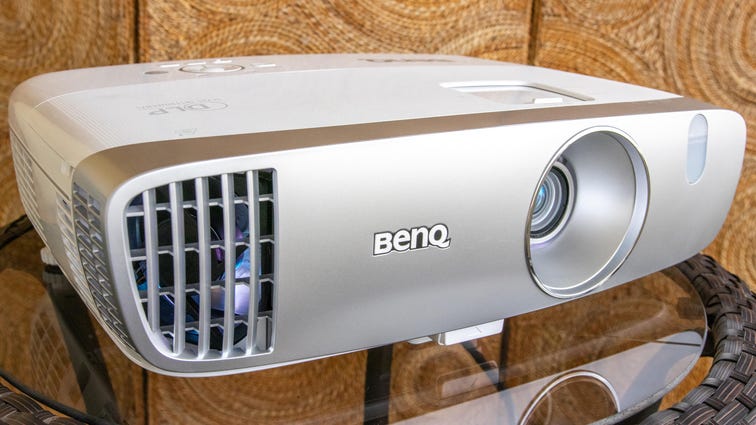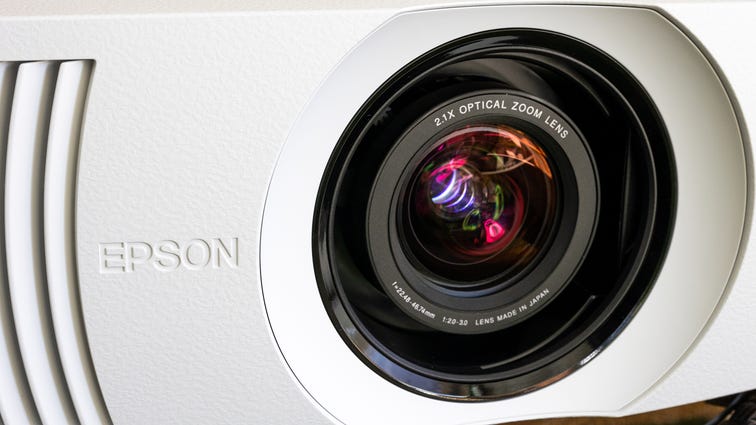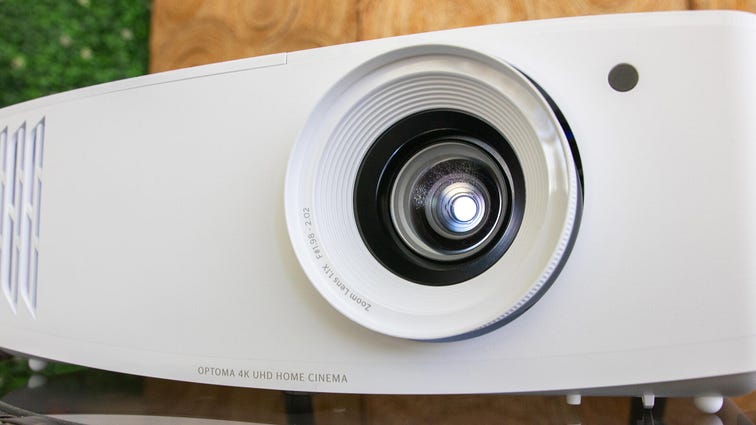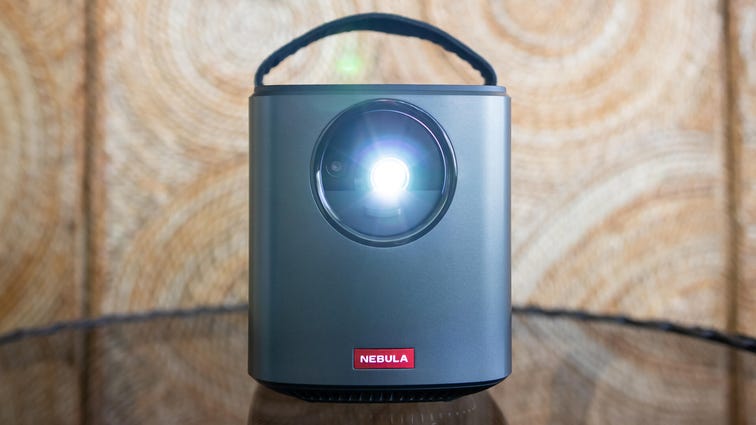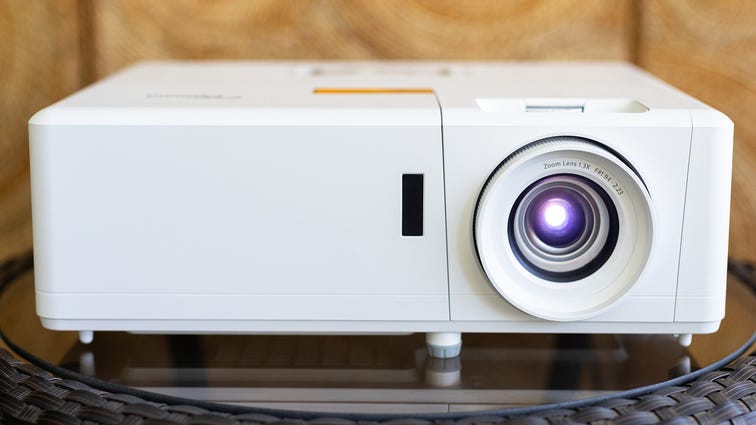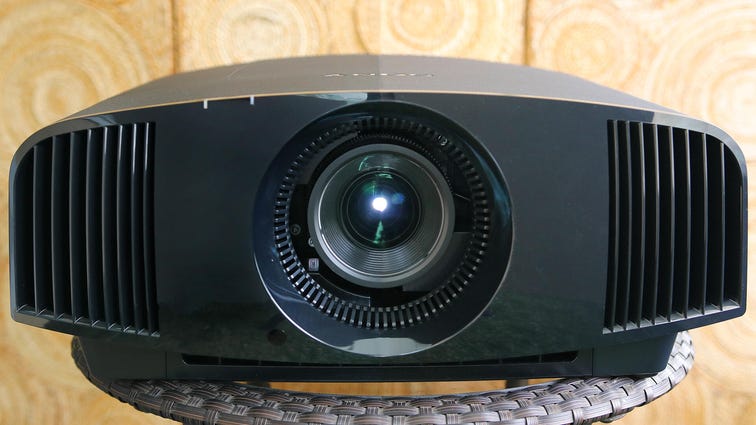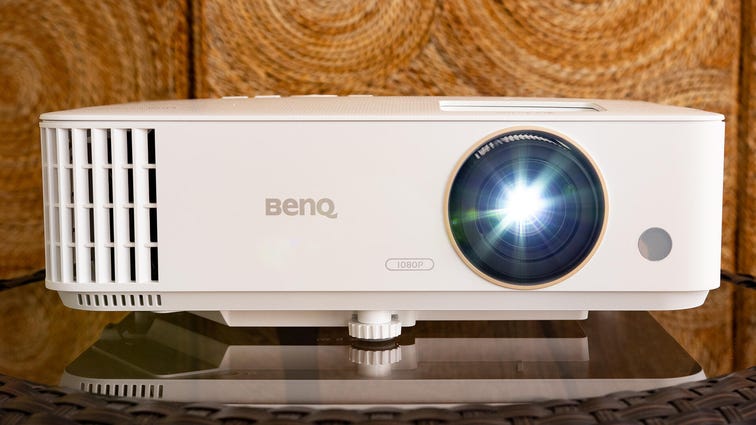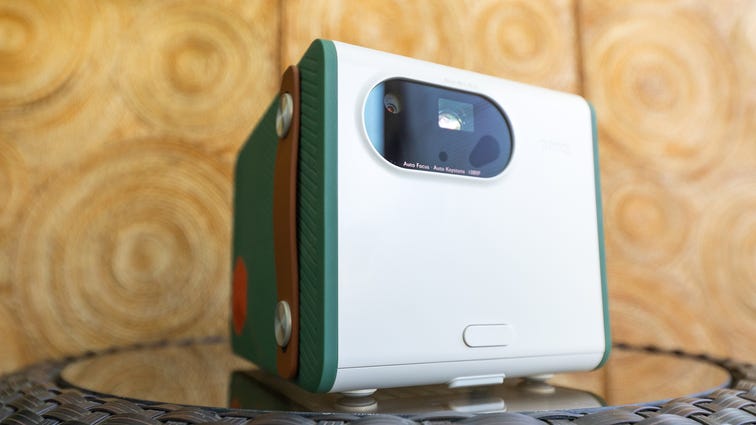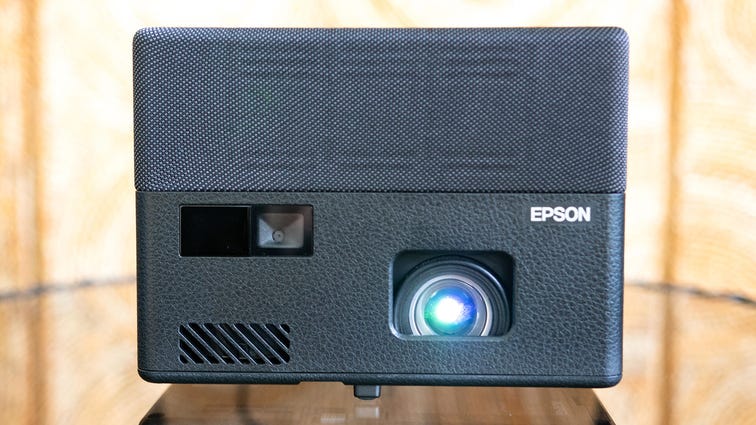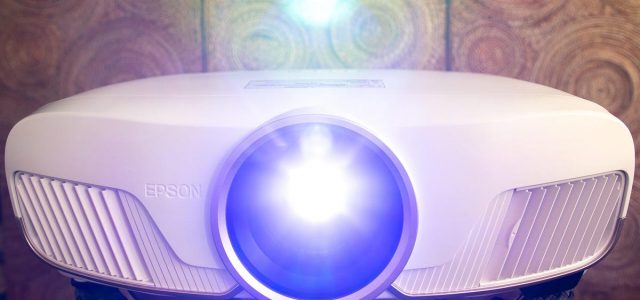
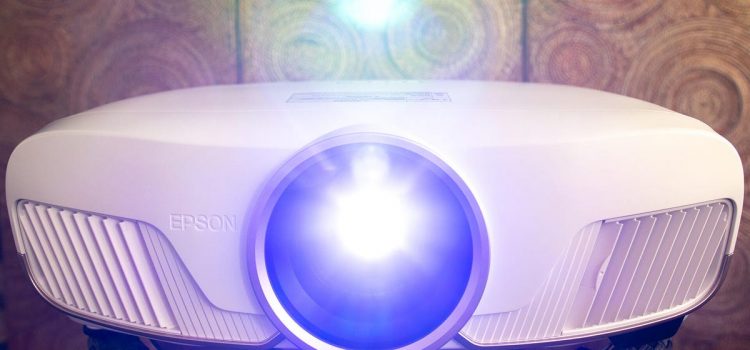

If you want to take your entertainment room to the next level, a home theater projector might be what you need — even if you already have a good TV. Home theater projectors are available with good picture quality, high brightness in ambient light, excellent color and a top-notch contrast ratio for $1,000 or less. With a projector, you can get a huge screen for a fraction of the price of a big TV, which may be the best part. And when you want to take movie night outside, there are portable and outdoor projector options to consider.
Whether you’re looking to buy a 4K projector, want something that’ll make HD sources look great or need something you can use on the go, you’re going to find the best home theater projectors on this list.
Geoffrey Morrison/CNET
The Epson Home Cinema 5050UB is the best all-around home projector we’ve reviewed. Take an excellent contrast ratio, paired with impressive brightness and accurate color, all with better detail than what’s possible with a 1080p native resolution projector, and you’ve got all the pieces for a fantastic image. This home entertainment projector is not cheap, but it offers a significant step up in image quality over other projectors on this list (aside from the Sony, which is nearly double the price). It comes with HDMI 2.0 which allows you to do 4k60p. Extensive lens shift and a motorized zoom are the icing on the cake.
Geoffrey Morrison/CNET
We wouldn’t put this in the “cheap projector” bucket, but the BenQ HT2050A is definitely the best video projector you can get for the money. This modern projector produces a bright picture with great contrast and lifelike color accuracy. It’s also one of the only comparable models with vertical lens shift, which makes setup a little easier. It supports most media players, gaming consoles, PCs, Macs, and mobile devices with input options such as HDMI, USB, and more. Plus, the projector offers a low input lag of 16ms for immersive gaming.
Geoff Morrison/CNET
The Epson Home Cinema LS11000 is similar to the Epson 5050 but instead of a lamp it uses a laser and phosphor combo to create light. This means even better color, no lamp replacements, faster turn on/off and a more usable dynamic contrast ratio. A more advanced different pixel shifter means better resolution than the 5050 as well. It’s more expensive to start, but over the life of the projector they should be about the same. So better picture quality for roughly the same total cost of ownership makes this well worth considering over the 5050.
Geoffrey Morrison/CNET
The Optoma UHD35 is a modern projector that packs a lot into its tiny case and low price. This budget projector can throw a ton of light, its color wheel produces accurate colors and has great detail. The contrast ratio isn’t great, but it’s pretty average among 4K resolution projectors in this price range. And that price really is the UHD35’s biggest selling point. This 4K UHD projector offers great picture quality for only a few hundred dollars over the best 1080p projectors. It doesn’t offer lens shift or much in the way of a zoom, but if it fits in your room it’s a great way to get a 4K projector on a budget.
Geoffrey Morrison/CNET
It’s smaller than a six-pack of Coke and equipped with Wi-Fi streaming, a surprisingly loud Bluetooth speaker and even a handle. It offers auto vertical and manual horizontal keystone correction. This portable mini projector powerhouse also has one thing many compact projectors lack: a built-in battery. This budget projector is an all-in-one entertainment machine that’s darn cute, too.
Geoffrey Morrison/CNET
The Optoma UHZ50 uses a blue laser and a yellow phosphor to create some incredibly bright, ultracolorful images. It’s bright and has the second-best contrast ratio we’ve measured from a DLP projector. Also, because it’s DLP, it has excellent detail. The zoom range and lens shift are fairly limited, so it won’t fit in as many rooms as the Epson 5050 or LS11000, but otherwise it’s very good.
Geoffrey Morrison/CNET
The Sony VPL-VW325ES is a thoroughbred among ponies, a Porsche among Volkswagens, an absolute stunner with a price tag to match. The contrast ratio, easily the most important aspect of overall picture quality, is better than the Epson 5050 and significantly better than any projector that doesn’t cost significantly more. And that’s saying something, since the Sony itself costs significantly more than any other projector on this list. It checks the box for gaming with the input lag reduction feature. And with brightness that can go up to 1,500 Lumens, it works well in a bright room as well. If price is no object, the picture quality is incredible.
Geoffrey Morrison/CNET
The BenQ GS50 is a lunchbox-size 1080p projector with a 2.5-hour battery, surprisingly powerful speakers and the ability to charge via a portable power bank. You can even use it as a Bluetooth speaker. It performs well for a portable projector, but costs about the same as BenQ’s own HT2050A, which performs far better. But for regular movie nights far from an outlet, it works great.
Geoffrey Morrison/CNET
The EF-12 is a small, highly portable projector that looks a lot like the Anker Nebula Pro and the BenQ GS50, but it fits a slightly different niche. It’s easy to tote and doubles as a Bluetooth speaker, but unlike those two it can’t run off of a battery — it requires AC power. The EF-12’s light is created by Epson’s “MicroLaser Array Projection Technology.” Yep, laser beams, which deliver a brighter picture than LED-based models like the Nebula and GS50.
Other products we’ve tested
Epson Home Cinema 880: The 880 is one of Epson’s less-expensive home projectors, but it still puts out a remarkable amount of light. That, and the price, make it tempting. The contrast ratio is terrible, however, so the overall image quality is weak. Check out our full review of the Epson Home Cinema 880.
LG HU810PW: The HU810PW is a higher-end, laser-powered projector with 4K resolution that’s able to create some lovely, colorful images. It’s also quiet and sports an attractive, boxy case. The contrast ratio is quite poor, so it doesn’t look nearly as good overall as other projectors in its overall price range. Check out our full review of the LG HU810PW.
Anker Nebula Solar Portable: The Solar Portable is a portable projector with a built-in battery that lasts 3 hours. It sports 1080p resolution, but it’s not very bright and the contrast isn’t great. While the Anker Mars II Pro has its own issues, overall it’s the better option for the same money. Check out our full review of the Anker Nebula Solar Portable.
How we test home theater projectors
Every projector we review goes through elaborate objective and subjective testing. CNET editors pick the products and services we write about based on editorial merit. When you buy through our links, we may get a commission.
For more info, check out how CNET tests projectors.
Home theater projector performance comparison
Projector Performance Comparison
| Brand | Model | Price | Resolution | Lumens** | Contrast Ratio** |
|---|---|---|---|---|---|
| Anker | Mars II Pro | $550 | 720p | 337 | 354:1 |
| Anker | Nebula Solar | $500 | 1080p | 196 | 407:1 |
| BenQ | HT2050A | $900 | 1080p | 1620 | 1220:1 |
| BenQ | TH625 | $1,000 | 1080p | 1641 | 853:1 |
| Epson | EF-12 | $900 | 1080p | 650 | 394:1 |
| Epson | HC 880 | $600 | 1080p | 2085 | 221:1 |
| Epson | HC 2250 | $750 | 1080p | 1729 | 1026:1 |
| Epson | HC 5050 | $3,000 | 1080p x2* | 1732 | 5203:1 |
| LG | HU810PW | $2,800 | 4K | 1498 | 490:1 |
| Optoma | UHD35 | $1,300 | 4K | 1567 | 649:1 |
| Optoma | UHZ50 | $2,800 | 4K | 1486 | 1007:1 |
| Sony | VPL-VE325ES | $5,500 | 4K | 1732 | 5203:1 |
*See review for more details
**as measured. See how CNET tests projectors for details.
Frequently asked questions about home theater projectors
What kind of projector should you get?
LCD and Digital Light Processing projectors are the most common technologies. Higher-end projectors often use LCOS, or liquid crystal on silicon, designs. These are marketed as SXRD and DILA. LCOS is superior to LCD and DLP in almost every way, but is significantly more expensive.
LCD (used almost exclusively by Epson) and DLP both have their strengths and weaknesses. DLP is typically sharper, LCD often brighter. However, both technologies offer bright, sharp images. It’s more down to the specific model of projector than specific technologies.
Do you need a screen for a better projector experience?
You can use any flat surface to project your image. However, don’t expect it to be the best surface for a projector. Any and all tiny bumps in a wall, for example, will be visible as extra “noise” in the image. This can be distracting. If you want the best image quality from your projector, even an inexpensive screen is a far better option. This is because projector screens tend to brighten the image noticeably and create a smooth surface that just shows your TV, movie or game.
Portable or home projector?
Portable models are expensive for their performance, but can work where there’s no outlet. If you don’t plan on ever using the projector away from your house, a traditional projector will be far brighter and can be used outside. Just remember to bring it in when you’re done.

